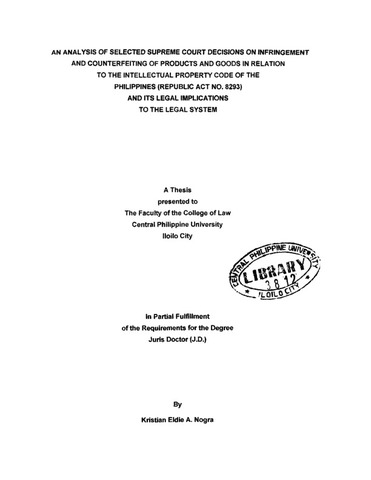An analysis of selected Supreme Court decisions on infringement and counterfeiting of products and goods in relation to the Intellectual Property Code of the Philippines (Republic Act No. 8293) and its legal implications to the legal system

Page views
1,988Дата
2019Автор
Thesis Adviser
Defense Panel Chair
Share
Metadata
Показать полную информацию
Аннотации
Ideas are a gruelling feature of a human mind to protect because they are so easily imitated or copied. We don't yet live in the world of Star Trek where you can just have a replicator instantly make you an exact duplicate of physical things like a cup of coffee or some exotic alien delicacy, but we can easily duplicate the ideas of others, such as copying a piece of written material, using a similar brand name, or creating a product in imitation of someone else’s product. Products take time to develop and bring to market. Once a product has been developed, it can be imitated in a fraction of the time. It would be easy for other companies to create competitive products or services within a very short period of time. For example, consider the recent “employee discount” advertising campaigns from the major auto manufacturers. General Motors came up with the idea, but Ford and Chrysler had imitated it within a couple of weeks after the GM campaign started. Advertising campaign ideas generally aren't protectable intellectual property. On the other hand, consider the innovative Segway transportation device. Once the very first one becomes publicly available, it would have been very easy for someone else to disassemble one, see how it was made, and start building less expensive imitations. That hasn't happened and won't happen anytime soon, because the Segway is protected by a patent, and the makers of Segway would have a solid legal basis for going after such a competitor for a lot of money. Intellectual property refers to those ideas that can be considered “owned” by an individual or company and are therefore protectable under the law. The intent of intellectual property law is to encourage innovation by giving the creators of new ideas ample time to profit from their ideas and recuperate their development costs. In theory, your intellectual property is protected under the law from the moment you create it, assuming someone else hasn't created it first (and even then in some circumstances). However, making the case in court may be very difficult if all you have to go on is your own records. Intellectual property registration exists so that you can make an official record of your ideas and more easily protect them should a conflict ever arise.
Описание
Abstract only
Suggested Citation
Nogra, K. E. A. (2019). An analysis of selected Supreme Court decisions on infringement and counterfeiting of products and goods in relation to the Intellectual Property Code of the Philippines (Republic Act No. 8293) and its legal implications to the legal system (Unpublished postgraduate thesis). Central Philippine University, Jaro, Iloilo City.
Type
ThesisТематика
Department
College of LawDegree
Juris DoctorShelf Location
Law Library 340.72 N68 2019
Physical Description
ix, 89 leaves
Collections
- Juris Doctor [144]
The following license files are associated with this item:


